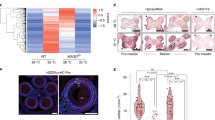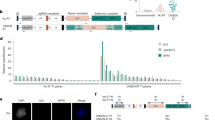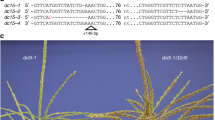Abstract
Eukaryotic genomes consist to a significant extent of retrotransposons that are suppressed by host epigenetic mechanisms, preventing their uncontrolled propagation1,2. However, it is not clear how this is achieved. Here we show that in Arabidopsis seedlings subjected to heat stress, a copia-type retrotransposon named ONSEN (Japanese ‘hot spring’) not only became transcriptionally active but also synthesized extrachromosomal DNA copies. Heat-induced ONSEN accumulation was stimulated in mutants impaired in the biogenesis of small interfering RNAs (siRNAs); however, there was no evidence of transposition occurring in vegetative tissues. After stress, both ONSEN transcripts and extrachromosomal DNA gradually decayed and were no longer detected after 20–30 days. Surprisingly, a high frequency of new ONSEN insertions was observed in the progeny of stressed plants deficient in siRNAs. Insertion patterns revealed that this transgenerational retrotransposition occurred during flower development and before gametogenesis. Therefore in plants with compromised siRNA biogenesis, memory of stress was maintained throughout development, priming ONSEN to transpose during differentiation of generative organs. Retrotransposition was not observed in the progeny of wild-type plants subjected to stress or in non-stressed mutant controls, pointing to a crucial role of the siRNA pathway in restricting retrotransposition triggered by environmental stress. Finally, we found that natural and experimentally induced variants in ONSEN insertions confer heat responsiveness to nearby genes, and therefore mobility bursts may generate novel, stress-responsive regulatory gene networks.
This is a preview of subscription content, access via your institution
Access options
Subscribe to this journal
Receive 51 print issues and online access
$199.00 per year
only $3.90 per issue
Buy this article
- Purchase on Springer Link
- Instant access to full article PDF
Prices may be subject to local taxes which are calculated during checkout




Similar content being viewed by others
References
Slotkin, R. K. & Martienssen, R. Transposable elements and the epigenetic regulation of the genome. Nature Rev. Genet. 8, 272–285 (2007)
Lisch, D. Epigenetic regulation of transposable elements in plants. Annu. Rev. Plant Biol. 60, 43–66 (2008)
Herr, A. J., Jensen, M. B., Dalmay, T. & Baulcombe, D. C. RNA polymerase IV directs silencing of endogenous DNA. Science 308, 118–120 (2005)
Mosher, R. A., Schwach, F., Studholme, D. & Baulcombe, D. C. PolIVb influences RNA-directed DNA methylation independently of its role in siRNA biogenesis. Proc. Natl Acad. Sci. USA 105, 3145–3150 (2008)
Miura, A. et al. Mobilization of transposons by a mutation abolishing full DNA methylation in Arabidopsis . Nature 411, 212–214 (2001)
Tsukahara, S. et al. Bursts of retrotransposition reproduced in Arabidopsis . Nature 461, 423–426 (2009)
Johannes, F. et al. Assessing the impact of transgenerational epigenetic variation on complex traits. PLoS Genet. 5, e1000530 (2009)
Reinders, J. et al. Compromised stability of DNA methylation and transposon immobilization in mosaic Arabidopsis epigenomes. Genes Dev. 23, 939–950 (2009)
Mirouze, M. et al. Selective epigenetic control of retrotransposition in Arabidopsis . Nature 461, 427–430 (2009)
Slotkin, R. K. et al. Epigenetic reprogramming and small RNA silencing of transposable elements in pollen. Cell 136, 461–472 (2009)
Mosher, R. A. et al. Uniparental expression of PolIV-dependent siRNAs in developing endosperm of Arabidopsis . Nature 460, 283–286 (2009)
Hsieh, T.-F. et al. Genome-wide demethylation of Arabidopsis endosperm. Science 324, 1451–1454 (2009)
Gehring, M., Bubb, K. L. & Henikoff, S. Extensive demethylation of repetitive elements during seed development underlies gene imprinting. Science 324, 1447–1451 (2009)
Tittel-Elmer, M. et al. Stress-induced activation of heterochromatic transcription. PLoS Genet. 6, e1001175 (2010)
Pecinka, A. et al. Epigenetic regulation of repetitive elements is attenuated by prolonged heat stress in Arabidopsis . Plant Cell 22, 3118–3129 (2010)
Hirochika, H., Okamoto, H. & Kakutani, T. Silencing of retrotransposons in Arabidopsis and reactivation by the ddm1 mutation. Plant Cell 12, 357–369 (2000)
Onodera, Y. et al. Plant nuclear RNA polymerase IV mediates siRNA and DNA methylation-dependent heterochromatin formation. Cell 120, 613–622 (2005)
Xie, Z. et al. Genetic and functional diversification of small RNA pathways in plants. PLoS Biol. 2, e104 (2004)
Naumann, K. et al. Pivotal role of AtSUVH2 in heterochromatic histone methylation and gene silencing in Arabidopsis . EMBO J. 24, 1418–1429 (2005)
Feuerbach, F., Drouaud, J. & Lucas, H. Retrovirus-like end processing of the tobacco Tnt1 retrotransposon linear intermediates of replication. J. Virol. 71, 4005–4015 (1997)
Hirochika, H. & Otsuki, H. Extrachromosomal circular forms of the tobacco retrotransposon Tto1 . Gene 165, 229–232 (1995)
Johnson, L. M., Law, J. A., Khattar, A., Henderson, I. R. & Jacobsen, S. E. SRA-domain proteins required for DRM2-mediated de novo DNA methylation. PLoS Genet. 4, e1000280 (2008)
Law, J. A. & Jacobsen, S. E. Establishing, maintaining and modifying DNA methylation patterns in plants and animals. Nature Rev. Genet. 11, 204–220 (2010)
Vaucheret, H. Plant ARGONAUTES. Trends Plant Sci. 13, 350–358 (2008)
Vagin, V. V. et al. A distinct small RNA pathway silences selfish genetic elements in the germline. Science 313, 320–324 (2006)
Piegu, B. et al. Doubling genome size without polyploidization: dynamics of retrotransposition-driven genomic expansions in Oryza australiensis, a wild relative of rice. Genome Res. 16, 1262–1269 (2006)
Ammiraju, J. S. S. et al. Evolutionary dynamics of an ancient retrotransposon family provides insights into evolution of genome size in the genus Oryza . Plant J. 52, 342–351 (2007)
Naito, K. et al. Unexpected consequences of a sudden and massive transposon amplification on rice gene expression. Nature 461, 1130–1134 (2009)
Lim, C. J. et al. Gene expression profiles during heat acclimation in Arabidopsis thaliana suspension-culture cells. J. Plant Res. 119, 373–383 (2006)
Vongs, A., Kakutani, T., Martienssen, R. A. & Richards, E. J. Arabidopsis thaliana DNA methylation mutants. Science 260, 1926–1928 (1993)
Acknowledgements
We thank all members of the J.P. laboratory and R. L. Fisher for discussions, L. Broger, M. Freyre, J. Nicolet, C. Mégies for technical assistance and P. King and J. Reinders for editing of the manuscript. This work was supported by grants from the Swiss National Science Foundation (31003A-125005) and the European Commission through the AENEAS collaborative project (FP7 226477), the RECBREED consortium (FP7 227190) and The Epigenome Network of Excellence (FP6 503433).
Author information
Authors and Affiliations
Contributions
H.I., E.B., H.G., M.M. and J.P. conceived the study. H.I., E.B., H.G., M.M. and I.V. performed the experiments. J.P. wrote the paper with contributions from E.B. and M.M.
Corresponding author
Ethics declarations
Competing interests
The authors declare no competing financial interests.
Supplementary information
Supplementary Information
The file contains Supplementary Figures 1-5 with legends, Supplementary Tables 1-2 and an additional reference. (PDF 4538 kb)
Rights and permissions
About this article
Cite this article
Ito, H., Gaubert, H., Bucher, E. et al. An siRNA pathway prevents transgenerational retrotransposition in plants subjected to stress. Nature 472, 115–119 (2011). https://doi.org/10.1038/nature09861
Received:
Accepted:
Published:
Issue Date:
DOI: https://doi.org/10.1038/nature09861
This article is cited by
-
Barley AGO4 proteins show overlapping functionality with distinct small RNA-binding properties in heterologous complementation
Plant Cell Reports (2024)
-
Multilayered regulation of secondary metabolism in medicinal plants
Molecular Horticulture (2023)
-
Regulation of gene editing using T-DNA concatenation
Nature Plants (2023)
-
Regulation of plant epigenetic memory in response to cold and heat stress: towards climate resilient agriculture
Functional & Integrative Genomics (2023)
-
Nearby transposable elements impact plant stress gene regulatory networks: a meta-analysis in A. thaliana and S. lycopersicum
BMC Genomics (2022)
Comments
By submitting a comment you agree to abide by our Terms and Community Guidelines. If you find something abusive or that does not comply with our terms or guidelines please flag it as inappropriate.



